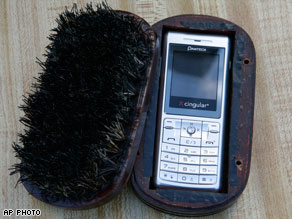 This article discusses the methods by which prisoners can currently make telephone calls in a Dayton, OH county jail. An interesting quote from the article is, “Monies made from jail commissary sales, including calling cards, are utilized to support the current jail inmate population.” The meshDETECT secure prison cell phone service is another means by which prisoners can stay in contact with friends and family. It also provides a revenue stream for cash-strapped prison systems while reducing the demand for contraband cell phones.
This article discusses the methods by which prisoners can currently make telephone calls in a Dayton, OH county jail. An interesting quote from the article is, “Monies made from jail commissary sales, including calling cards, are utilized to support the current jail inmate population.” The meshDETECT secure prison cell phone service is another means by which prisoners can stay in contact with friends and family. It also provides a revenue stream for cash-strapped prison systems while reducing the demand for contraband cell phones.
Sale of pre-paid telephone cards to inmates in the Montgomery County Jail, along with charges for outgoing collect calls, generate hundreds of thousands of dollars annually for jail services, according to officials.
Whether inmates have money or not, they’re allowed the traditional “one” telephone call to arrange bail or to post bond.
“We give them as many calls as they need to let people know where they are,” Major Daryl Wilson, of the Montgomery County Sheriff’s Office said.
After the initial booking, inmates must pay for their telephone calls.
They can opt to use the jail telephone to make a collect call to a landline, which costs $2.25 for the initial call, then 25 cents for every minute thereafter. This charge offsets the cost for an operator and pays for repairs to the “heavy duty telephones” used by the inmates, Wilson said.
Any additional revenue goes into the county general fund. Wilson estimated the collect-call charge would generate about $200,000 in 2011.
Collect calls can’t be made to cell phones, so the jail offers a second option.
If inmates want to call cell phones, they or a relative may purchase a $10 pre-paid, Global Tel-Link, Corp. calling card from the jail commissary. These cards also may be used to call land lines, Wilson said. Each card is good for up to three 15 minute telephone calls.
Three days after inmates are booked in the jail, they may ask for cash in their possession at the time of their arrest to be transferred into a commissary account. Aramark Correctional Services, the vendor providing food service at the jail, also runs they commissary where the calling cards are purchased. Montgomery County gets 42 percent of the revenue from those sales, with the balance going to Aramark, Wilson said.
The calling cards generate about $3,000 a week for the jail, or $156,000 a year.
“Monies made from jail commissary sales, including calling cards, are utilized to support the current jail inmate population,” Wilson said. “We can’t go out and buy new cruisers with that money. It can’t go out to pay salaries. It has to be spent on the inmates, according to Ohio law.”
- Blockchain System for Compliant Inmate Transactions - March 4, 2025
- Securus Gets the Signal, Eleven Years Later - August 23, 2024
- Multi-Blockchain System for Inmate Forensics - April 2, 2024




